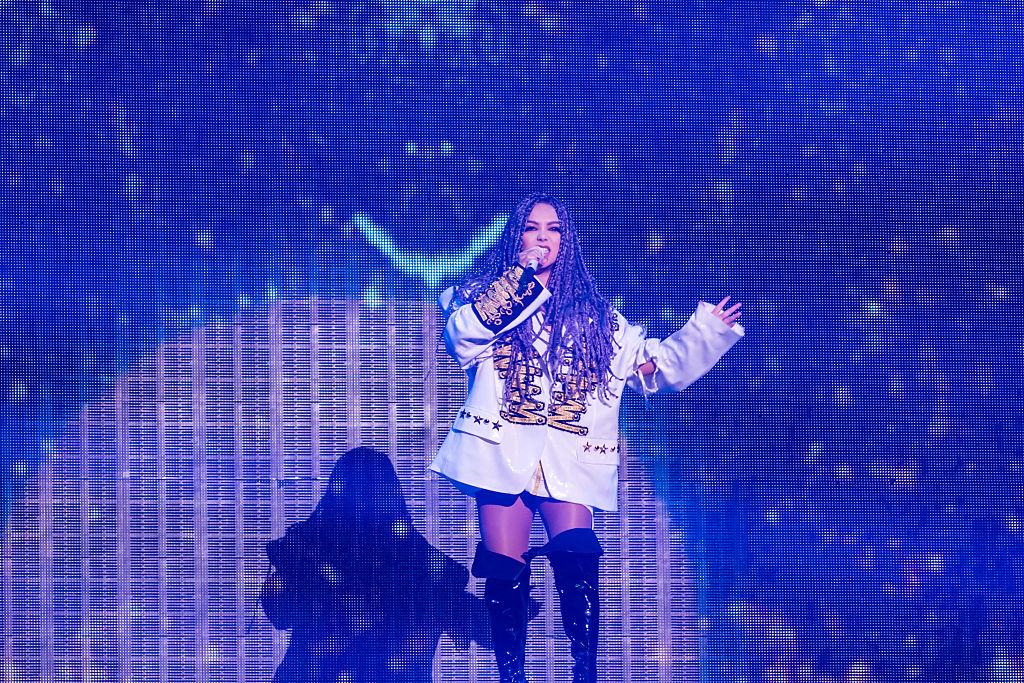
Beijing concert-goers say they were prevented from displaying rainbow imagery at a pop singer’s performance on Saturday, in a sign of increasing tightening on LGBTQ expression in China.
Fans attending a concert by Taiwanese singer Chang Hui-mei — better known by her stage name A-Mei — say they were prevented from wearing shirts with rainbows on them inside the Cadillac Arena in Beijing, according to participants who posted about the incident on social media.
A person who wrote about the concert on China’s Instagram-style Xiaohongshu service said a security guard at the venue asked them to turn his shirt inside out, as a rainbow had been drawn on the front. In another post, a person said they were stopped by security because their shirt changed colors based on reflective lighting.
Kang Kang posted on Xiaohongshu that he was asked by security to change out of a shirt with a rainbow print into black clothing provided by guards. He told Bloomberg News that the security guards wouldn’t elaborate on why the T-shirt wasn’t allowed.
Bloomberg News has reached out to those people for comment. A-Mei’s management, her Chinese concert organizer and the Cadillac Arena did not respond to requests for comment. An official at the Beijing Cultural and Tourism Bureau — which approved the weekend shows — said via phone that the bureau was only in charge of vetting the eligibility of the concert organizers.
The accounts from the concert attendees in Beijing add to signs that LGBTQ community members and advocates are facing increasing pressure as the nation promotes more conservative and traditional gender and sexual identity values under President Xi Jinping.
Dozens of WeChat accounts run by LGBTQ groups at leading universities were shut in 2021. In May, a prominent LGBTQ center in China closed down after 15 years. Several events related to June’s Pride celebrations were also canceled or postponed in the wake of a crackdown on entertainment.
Rainbow colors are widely associated with the LGBTQ pride flag, and A-Mei is known as an outspoken advocate for the community, having been the first ambassador for Taiwan Pride in 2007. She also held a free concert in Taipei in late 2013 supporting same-sex marriage there, and organized another concert in Taiwan in 2016 to rally support for a marriage equality bill that eventually passed.
Tian, 30, who asked to be identified only by his surname while discussing sensitive issues, said he attended another A-Mei concert on Sunday in Beijing. He didn’t see any rainbows in the crowd, nor did he see guards confiscate any such imagery.
He attributed that, though, to the possibility that some people may have been more aware of potential issues following Saturday’s event and decided not to wear rainbow colors, given the number of social media posts about the security push-back on such gear.
The song lineup at the concert Tian attended also didn’t include A-Mei’s tune “Rainbow,” which features queer themes. And he said one song “Bad Boy,” which at prior concerts has featured background video containing rainbow imagery, no longer contained such references.
Tian, who identifies as gay, said there is resignation in China about how the LGBTQ community is treated there, though he said preventing people from wearing rainbow colors at a concert went too far.
Being gay, bisexual or transgender is increasingly seen by some in China as a concept imported from the West. That misconception draws on the fact that many foreign embassies in Beijing have highlighted gay rights, including by promoting Pride colors either by flying flags or illuminating their buildings with rainbows.
Tsinghua University — one of China’s most prestigious colleges and Xi’s alma mater — issued warnings to two students last year for distributing LGBTQ rainbow flags on campus.
“When I watched A-Mei it was at Beijing Workers’ Sports Complex in 2015. Back then we could still pass around a gigantic rainbow flag,” the Xiaohongshu user who was asked to turn their shirt inside-out wrote on the service. “Now the security guard is really carefully checking all the rainbow elements. What exactly are you afraid of?”
More Must-Reads from TIME
- Why Biden Dropped Out
- Ukraine’s Plan to Survive Trump
- The Rise of a New Kind of Parenting Guru
- The Chaos and Commotion of the RNC in Photos
- Why We All Have a Stake in Twisters’ Success
- 8 Eating Habits That Actually Improve Your Sleep
- Welcome to the Noah Lyles Olympics
- Get Our Paris Olympics Newsletter in Your Inbox
Contact us at letters@time.com